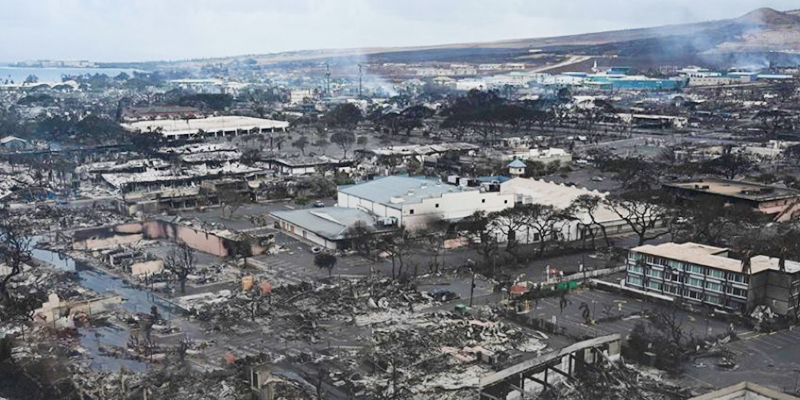
August 15, 2023
Wildfires have ravaged the island of Maui, destroying homes and businesses and forcing thousands of people to evacuate. Cell phone service and internet access have been disrupted, leaving many residents without a way to communicate with loved ones or get updates on the disaster. Local broadcasters have stepped up to provide lifeline service, broadcasting live updates on the fires and keeping the community informed. As they continue to support a community in crisis, it is urgent that these local stations get the information and resources they need.
Emergency experts recommend families keep a battery-operated radio as part of their emergency kits, because during disaster, broadcasting’s efficiency and resilience makes it a vital communications resource. "Radio has been the only lifeline and line of communication to the people of West Maui. For days there has been no power, no water, and no Internet service," Chuck Bergson, president and CEO, Pacific Media Group, told Radio Ink.
"It was frustrating in the early stages of the crisis because the local government officials did not fully understand the capabilities and importance of radio," he continued. "In the beginning, they were directing people to a website but that was useless because no one had internet."
"We hear their crying, their tears, their desperate pleas," Brandee Carvalho, host at Maui's KISS radio, told Hawaii News Now. "It is real. It's very real for me."
These radio stations came together to broadcast daily updates from local government as well as information on emergency supplies and evacuation shelters.
After a natural disaster, local stations are there to support recovery, organize charitable projects and provide in-depth reporting on the aftermath.
The iHeartMedia Honolulu station group announced the #KokuaforMaui fundraiser to collect donations for the American Red Cross. "The people of Maui are our neighbors and iHeartMedia Honolulu is proud to do whatever we can to empower our ohana and friends on Maui to recover and rebuild in the face of what appears to be the deadliest natural disaster in Hawaii history," said Jamie Hyatt, senior vice president of Programming, iHeartMedia Honolulu.
Bonneville International announced a relief fundraiser for the Hawaii Community Foundation, kicking off the efforts with a $15,000 donation from the company's foundation. "Bonneville International has always been deeply rooted in the communities it serves. With so many connections to the islands throughout the west, especially in the states our markets serve, Maui Strong is a testament to our commitment to stand by our neighbors in times of crisis," says Tanya Vea, president and COO, Bonneville International.
In addition, these local outlets provide a voice for officials looking to communicate with the public. Round-the-clock coverage of the fires from Nexstar Media Group's KHON 2 included a request from Gov. Josh Green and the Hawaii Housing Finance and Development Corporation for applications for a program to provide housing to displaced Maui residents.
Looking ahead to long-term recovery efforts, Allen Media Group’s KITV4 shared an interview with community leader Paele Kiakona about the implications of the disaster on Hawaii’s community and sacred grounds. "We're all hurt. We're all grieving," Kiakona told the station. "A lot of our hearts were here and it's now completely gone. But we're still here and we have to keep it that way. So it's time for us to get up and rebuild. We cannot sit back and feel sorry for ourselves. This is a time for us to stand together as a community, a strong community that we know we are."
The broadcasters' lifeline service has been invaluable to the people of Maui. It has helped them stay informed about the situation, connect with loved ones and get the help they need. It is a reminder of the important role that broadcasters play in our communities, especially during times of crisis.
More than 2.46 million American jobs depend on broadcasting. The local broadcast television and radio industry and the businesses that depend on it generate $1.19 trillion annually for the nation's economy.